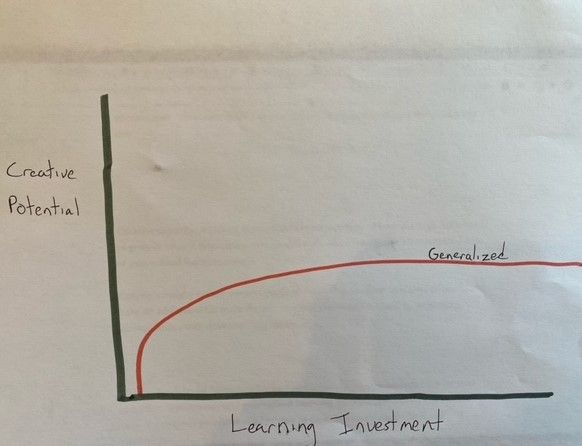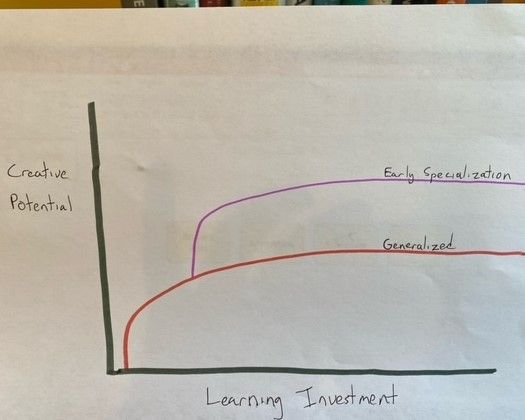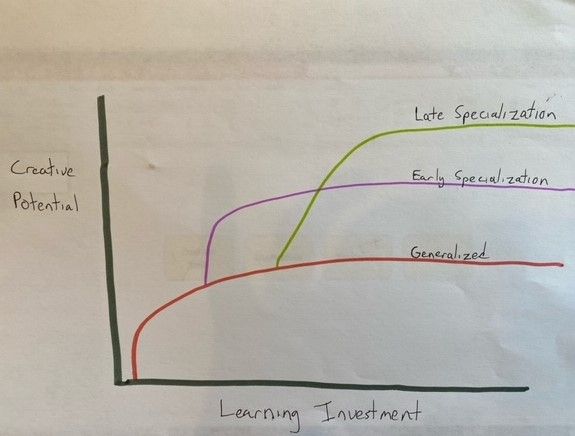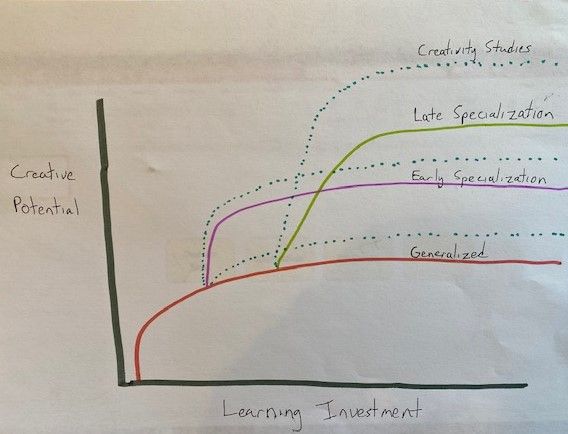Horizontal vs Vertical Learning

Range by David Epstein taught me that general learning, especially early in life, provides benefit through two mechanisms: 1) it allows later specialists to make novel connections between their area of expertise and other fields and 2) sampling of different activities increases the probability of finding a field that you are passionate about.
Epstein's work bridges to Teresa Amabile's Theory of Creativity by speaking to two of her four components, Motivation and Skills. Professor Amabile shows that creativity is a function of four components:

Epstein's argument, in Ambile's framework, is that range improves creativity by increasing Motivation and Skills. The former is a result of the sampling - if you test your interest in 10 different activities, when you finally focus on one activity, your passion is likely to be higher than if your selection set was just one activity.
For skills, Epstein argues coming to a specialization later in life allows a creator to bring an outside perspective, which provides more value than the benefit of the forgone hours and years of deliberate practice in the field (the 'head start' provided by early specialization). He is arguing the 'Domain Skills' that lead to exceptional performance are horizontal, general knowledge and skills acquired in other contexts then applied to the new task, rather than vertical, skills that are developed through deliberate practice in a chosen field.
Amabile has a different view. She writes:
"whoever heard of a scientist who did creative work in nuclear physics without learning any nuclear physics? And no child will do any creative work in painting until she learns to hold the paintbrush, mix the colors, and make the marks she intends to make on the paper." - Growing Up Creative (1989), Teresa Amabile
Amabile's work focuses heavily on developing domain specific skills. Her contribution is an antecedent to the now famous 10,000 hours study made famous by Malcolm Gladwell's Outliers. Gladwell notes the 10,000 hours is associated with mastery, but Amabile makes the broader point: deliberate practice in a focused area improves creative capacity in that field. Skills are a prerequisite for creative acts.
But, what about for the study of creativity itself? Would deliberate study of creativity research (a vertical approach) improve subsequent creative capacity?
Today, creativity is taught horizontally. Without using the word creativity, students learn to develop and share novel and meaningful ideas throughout their day - whether that is in a writing assignment in English, solving math problems in small groups, or developing a science project. Students attend English, Math and Science class. There is no Creativity class.
Horizontal learning of creativity provides a base foundation for creative acts in many different domains. A visual representation of specific creative potential while in this generalized mode of learning would look something like this:

The slope of the line decreases over time as a result of the diminishing incremental benefit of a generalized education. Learning the alphabet, algebra or how to hold a paintbrush provides a huge benefit for initial capacity. The third Dostoevsky novel or trigonometry make a smaller contribution.
In other words, all K12 students today are provided some degree of Range.
At some point, inside or outside of formal school, a spark may go off, and through increased motivation or other mechanism, a learner focuses on a specific area of focus. Creative potential increases through deliberate practice, looking something like this:

There is a high initial rate of growth, then it diminishes over time for the same reason the incremental value of generalized learning decays.
Epstein's insight is that creative outliers, those that produce exceptional work, delay this specialization and benefit from the additional investment in generalized learning. Then, they subsequently reach a higher creative level by importing lessons from other domains. His model is:

I accept both Epstein's work and Amabile's model for creativity. My argument is that Amabile's model is underappreciated as a learning tool. We could improve creative potential regardless of a student's current capacity, chosen domain, or stage of specialization by teaching how creativity works. My learning model is:

Vertical Learning in Creativity
Creativity Studies is a dedicated curriculum on the study of creativity itself. The program would teach the four components of creativity, and then extend learning through exercises, community, and software to enable student directed growth in whatever creativity component is needed.
With better understanding of the four building blocks of creativity, students can determine where to focus to improve their own potential. For some, increased investment in domain specific skills will be the right course, but others may benefit more from improved processes.
Creative Studies teaches how to learn, not what to do.
If well designed, the program would be research based, personalized and engaging for all levels of creative potential. The work would supplement, not replace, existing training programs.
Budding novelists will continue their study of English. But, in addition, they will have a framework for understanding how their Environment, Motivation and Processes contribute to their potential, enabling an improved approach to developing their craft.
Extending to all creative work, the individual and social benefits would be immense.
